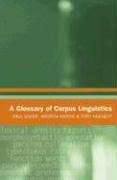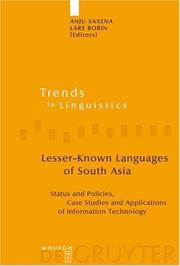| Listing 1 - 10 of 10 |
Sort by
|
Multi
ISBN: 9780521547369 9780521838511 0521838517 0521547369 9780511981395 9781139158763 1139158767 9781139160810 1139160818 0511981392 1283340895 9781283340892 1139152432 9781139152433 1107225620 9781107225626 9786613340894 6613340898 1139155253 9781139155250 1139157000 9781139157001 113915981X Year: 2012 Publisher: Cambridge New York
Abstract | Keywords | Export | Availability | Bookmark
 Loading...
Loading...Choose an application
- Reference Manager
- EndNote
- RefWorks (Direct export to RefWorks)
"Corpus linguistics is the study of language data on a large scale - the computer-aided analysis of very extensive collections of transcribed utterances or written texts. This textbook outlines the basic methods of corpus linguistics, explains how the discipline of corpus linguistics developed, and surveys the major approaches to the use of corpus data. It uses a broad range of examples to show how corpus data has led to methodological and theoretical innovation in linguistics in general. Clear and detailed explanations lay out the key issues of method and theory in contemporary corpus linguistics. A structured and coherent narrative links the historical development of the field to current topics in 'mainstream' linguistics. Practical activities and questions for discussion at the end of each chapter encourage students to test their understanding of what they have read and an extensive glossary provides easy access to definitions of technical terms used in the text"--
Corpora (Linguistics) --- LANGUAGE ARTS & DISCIPLINES / Linguistics / General --- Corpus-based analysis (Linguistics) --- Corpus linguistics --- Linguistic analysis (Linguistics) --- Computerlinguïstiek --- Corpuslinguïstiek --- Computerlinguïstiek. --- Corpus linguistics. --- Corpuslinguïstiek. --- Corpus (Linguistique) --- Mathematical linguistics --- Corpus linguistique --- Arts and Humanities --- Language & Linguistics

ISBN: 9780748620180 9780748624034 0748624031 0748620184 9786610553938 1322981205 1280553936 0748626905 9780748626908 9781322981208 9781280553936 Year: 2006 Publisher: Edinburgh Edinburgh University Press
Abstract | Keywords | Export | Availability | Bookmark
 Loading...
Loading...Choose an application
- Reference Manager
- EndNote
- RefWorks (Direct export to RefWorks)
Presents a comprehensive glossary of terms used in corpus linguistics. This alphabetic guide provides definitions and discussion of key terms used in corpus linguistics. Written by a team of experienced academics in the field, it provides coverage of both traditional and contemporary terminology.
Computational linguistics --- Computational linguistics. --- Corpus linguistics --- Corpuslinguïstiek --- woordenboeken. --- #KVHA:Taalkunde. Woordenboeken. Engels; verklarende --- #KVHA:Corpuslinguistiek. Woordenboeken. Engels --- 800:311 --- 800 <03> --- 800:311 Kwantitatieve linguistiek. Computerlinguistiek --- Kwantitatieve linguistiek. Computerlinguistiek --- 800 <03> Taalwetenschap. Taalkunde. Linguistiek--Naslagwerken. Referentiewerken --- Taalwetenschap. Taalkunde. Linguistiek--Naslagwerken. Referentiewerken --- Automatic language processing --- Language and languages --- Language data processing --- Linguistics --- Natural language processing (Linguistics) --- Applied linguistics --- Cross-language information retrieval --- Mathematical linguistics --- Multilingual computing --- Data processing --- Computational linguistics - Terminology
Book
ISBN: 0748677399 0748677380 9780748677382 9780748677375 0748677372 0748677372 9780748677375 1474485456 Year: 2019 Publisher: Edinburgh
Abstract | Keywords | Export | Availability | Bookmark
 Loading...
Loading...Choose an application
- Reference Manager
- EndNote
- RefWorks (Direct export to RefWorks)
This book demonstrates the advantage of a corpus based approach to Arabic, and presents an overview of current research on the Arabic language within corpus linguistics. Dealing not only with modern standard Arabic, the book also considers classical and colloquial forms.
Arabic language --- Semitic languages --- Grammar, Comparative. --- Research --- Data processing.
Book
ISBN: 9781350016620 1350016624 1350016853 9781350016859 1350017957 9781350017955 Year: 2023 Publisher: London: The Arden Shakespeare,
Abstract | Keywords | Export | Availability | Bookmark
 Loading...
Loading...Choose an application
- Reference Manager
- EndNote
- RefWorks (Direct export to RefWorks)
"The Encyclopedia of Shakespeare's Language is a two-volume encyclopedia offering the first comprehensive account of Shakespeare's language to use computational methods derived from corpus linguistics - methods of choice for today's lexicographer. Volume 1 is a dictionary from A-M, focussing on the use and meanings of Shakespeare's words, both in the context of what he wrote and in the context in which he wrote. Every word is compared with a 321 million word corpus comprising the work of Shakespeare's contemporaries. The volume establishes in detail both what is unique about Shakespeare's language and what Shakespeare's language meant to his contemporaries, including, for example, their attitudes towards love or death, what it meant to be Welsh or a harlot, or even the significance of eating fish as opposed to beef. Volume 2 is a dictionary from N-Z. As with the first volume, internal comparisons reveal how Shakespeare's language varies dynamically across his works. These show, for example, whether certain words are peculiar to tragedies, comedies or histories, and/or to certain social groups, such as people of high or low social rank, men or women, and they show the stylistic flavour of words, for example whether a word is literary or colloquial"--
Digital
ISBN: 9780748677382 Year: 2019 Publisher: Edinburgh Edinburgh University Press
Abstract | Keywords | Export | Availability | Bookmark
 Loading...
Loading...Choose an application
- Reference Manager
- EndNote
- RefWorks (Direct export to RefWorks)

ISBN: 9780748626908 9780748620180 Year: 2022 Publisher: Edinburgh Edinburgh University Press
Abstract | Keywords | Export | Availability | Bookmark
 Loading...
Loading...Choose an application
- Reference Manager
- EndNote
- RefWorks (Direct export to RefWorks)
Digital

ISBN: 9780748677382 9780748677375 Year: 2022 Publisher: Edinburgh Edinburgh University Press
Abstract | Keywords | Export | Availability | Bookmark
 Loading...
Loading...Choose an application
- Reference Manager
- EndNote
- RefWorks (Direct export to RefWorks)
Book

ISBN: 2917902590 Year: 2014 Publisher: Paris : Publications de l’Institut national d’histoire de l’art,
Abstract | Keywords | Export | Availability | Bookmark
 Loading...
Loading...Choose an application
- Reference Manager
- EndNote
- RefWorks (Direct export to RefWorks)
This handbook gathers a selection of texts by the speakers at the Training School “Architectural Research in the Digital Era” (Ghent, 2-6 April 2013) and the workshop “GIS, data visualization an open community” (Paris, 27-28 January 2014). The aims of these two events organised in the framework of the COST ISO904 Action European architecture beyond Europe: Sharing Research and Knowledge on Dissemination Processes, Historical Data and Material Legacy (19th-20th centuries), was to familiarize the participants, architectural historians with a variety of aspects related to conducting research in a digital era: Architectural history research in the digital era Copyrights; Standards, metadata, interoperability and sustainability; Data visualisation; Creating a digital research environment, GIS and Open communities.
Architecture --- Library, Information & Communication sciences --- digital humanities --- architecture --- museum policies --- art images
Digital

ISBN: 9783110225600 9783110225594 Year: 2009 Publisher: Berlin ;; Boston De Gruyter Mouton
Abstract | Keywords | Export | Availability | Bookmark
 Loading...
Loading...Choose an application
- Reference Manager
- EndNote
- RefWorks (Direct export to RefWorks)


ISBN: 9783110197785 9783110189766 Year: 2008 Publisher: Berlin ;; Boston De Gruyter Mouton
Abstract | Keywords | Export | Availability | Bookmark
 Loading...
Loading...Choose an application
- Reference Manager
- EndNote
- RefWorks (Direct export to RefWorks)
| Listing 1 - 10 of 10 |
Sort by
|

 Search
Search Feedback
Feedback About UniCat
About UniCat  Help
Help News
News